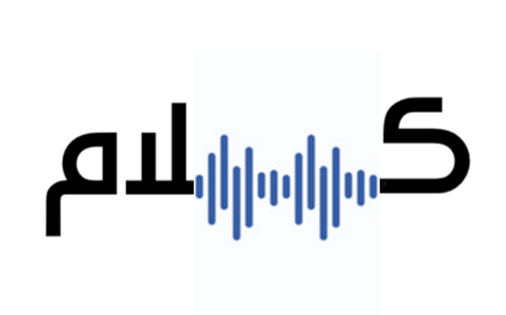Arabic speech recognition, classification and text-to-speech using many advanced models like wave2vec and fastspeech2. This repository allows training and prediction using pretrained models.
from klaam import SpeechClassification
model = SpeechClassification()
model.classify(wav_file)from klaam import SpeechRecognition
model = SpeechRecognition()
model.transcribe(wav_file)from klaam import TextToSpeech
prepare_tts_model_path = "../cfgs/FastSpeech2/config/Arabic/preprocess.yaml"
model_config_path = "../cfgs/FastSpeech2/config/Arabic/model.yaml"
train_config_path = "../cfgs/FastSpeech2/config/Arabic/train.yaml"
vocoder_config_path = "../cfgs/FastSpeech2/model_config/hifigan/config.json"
speaker_pre_trained_path = "../data/model_weights/hifigan/generator_universal.pth.tar"
model = TextToSpeech(prepare_tts_model_path, model_config_path, train_config_path, vocoder_config_path, speaker_pre_trained_path)
model.synthesize(sample_text)There are two avilable models for recognition trageting Modern Standard Arabic (MSA) and Egyptian dialect (EGY) . You can set any of them using the lang attribute.
from klaam import SpeechRecognition
model = SpeechRecognition(lang = 'msa')
model.transcribe('file.wav')| Dataset | Description | Link |
|---|---|---|
| MGB-3 | Egyptian Arabic Speech recognition in the wild. Every sentence was annotated by four annotators. More than 15 hours have been collected from YouTube. | here [Registeration required] |
| ADI-5 | More than 50 hours collected from Aljazeera TV. 4 regional dialectal: Egyptian (EGY), Levantine (LAV), Gulf (GLF), North African (NOR), and Modern Standard Arabic (MSA). This dataset is a part of the MGB-3 challenge. | here [Registeration required] |
| Common voice | Multlilingual dataset avilable on huggingface | here. |
| Arabic Speech Corpus | Arabic dataset with alignment and transcriptions | here. |
Our project currently supports four models, three of them are avilable on transformers.
| Language | Description | Source |
|---|---|---|
| Egyptian | Speech recognition | wav2vec2-large-xlsr-53-arabic-egyptian |
| Standard Arabic | Speech recognition | wav2vec2-large-xlsr-53-arabic |
| EGY, NOR, LAV, GLF, MSA | Speech classification | wav2vec2-large-xlsr-dialect-classification |
| Standard Arabic | Text-to-Speech | fastspeech2 |
| Name | Description | Notebook |
|---|---|---|
| Demo | Classification, Recongition and Text-to-speech in a few lines of code. |
|
| Demo with mic | Audio Recongition and classification with recording. |
|
The scripts are a modification of jqueguiner/wav2vec2-sprint.
This script is used for the classification task on the 5 classes.
python run_classifier.py \
--model_name_or_path="facebook/wav2vec2-large-xlsr-53" \
--output_dir=/path/to/output \
--cache_dir=/path/to/cache/ \
--freeze_feature_extractor \
--num_train_epochs="50" \
--per_device_train_batch_size="32" \
--preprocessing_num_workers="1" \
--learning_rate="3e-5" \
--warmup_steps="20" \
--evaluation_strategy="steps"\
--save_steps="100" \
--eval_steps="100" \
--save_total_limit="1" \
--logging_steps="100" \
--do_eval \
--do_train \This script is for training on the dataset for pretraining on the egyption dialects dataset.
python run_mgb3.py \
--model_name_or_path="facebook/wav2vec2-large-xlsr-53" \
--output_dir=/path/to/output \
--cache_dir=/path/to/cache/ \
--freeze_feature_extractor \
--num_train_epochs="50" \
--per_device_train_batch_size="32" \
--preprocessing_num_workers="1" \
--learning_rate="3e-5" \
--warmup_steps="20" \
--evaluation_strategy="steps"\
--save_steps="100" \
--eval_steps="100" \
--save_total_limit="1" \
--logging_steps="100" \
--do_eval \
--do_train \This script can be used for Arabic common voice training
python run_common_voice.py \
--model_name_or_path="facebook/wav2vec2-large-xlsr-53" \
--dataset_config_name="ar" \
--output_dir=/path/to/output/ \
--cache_dir=/path/to/cache \
--overwrite_output_dir \
--num_train_epochs="1" \
--per_device_train_batch_size="32" \
--per_device_eval_batch_size="32" \
--evaluation_strategy="steps" \
--learning_rate="3e-4" \
--warmup_steps="500" \
--fp16 \
--freeze_feature_extractor \
--save_steps="10" \
--eval_steps="10" \
--save_total_limit="1" \
--logging_steps="10" \
--group_by_length \
--feat_proj_dropout="0.0" \
--layerdrop="0.1" \
--gradient_checkpointing \
--do_train --do_eval \
--max_train_samples 100 --max_val_samples 100We use the pytorch implementation of fastspeech2 by ming024.
The procedure is as the following:
- Download the dataset and unzip it.
wget http://en.arabicspeechcorpus.com/arabic-speech-corpus.zip
unzip arabic-speech-corpus.zip
- Create multiple directories for data
mkdir -p raw_data/Arabic/Arabic preprocessed_data/Arabic/TextGrid/Arabic
cp arabic-speech-corpus/textgrid/* preprocessed_data/Arabic/TextGrid/Arabic
- Prepare metadata
import os
base_dir = '/content/arabic-speech-corpus'
lines = []
for lab_file in os.listdir(f'{base_dir}/lab'):
lines.append(lab_file[:-4]+'|'+open(f'{base_dir}/lab/{lab_file}', 'r').read())
open(f'{base_dir}/metadata.csv', 'w').write(('\n').join(lines))- Clone my repository (FastSpeech2) and installl the dependencies required.
git clone --depth 1 https://github.com/zaidalyafeai/FastSpeech2
cd FastSpeech2
pip install -r requirements.txt- Prepare alignments and prepreocessed data.
python3 prepare_align.py config/Arabic/preprocess.yaml
python3 preprocess.py config/Arabic/preprocess.yaml
- Unzip vocoders.
unzip hifigan/generator_LJSpeech.pth.tar.zip -d hifigan
unzip hifigan/generator_universal.pth.tar.zip -d hifigan
- Start the training.
python3 train.py -p config/Arabic/preprocess.yaml -m config/Arabic/model.yaml -t config/Arabic/train.yaml
This repository was created by the ARBML team. If you have any suggestion or contribution feel free to make a pull request.
